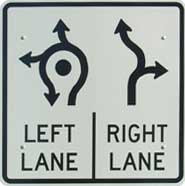

If your career is a car, are you driving down a straight road? Or, do you picture yourself going around a rotary, seeing a number of exits, and then selecting one? In other words, is your career path more like a straightaway or a rotary? This is an important question to understand as you go about your personal branding,executive resume writing, and career management.
Let's imagine you are a VP of IT. Did you get there by starting out as a programmer, progressing to managing a team as a Team Lead, then a Project Manager, then moving up to Program Manager, then Director of IT, and now VP of IT? That's the straight path.
Many of my clients have progressed along a straight and logical path very similar to the one just described.
But sometimes my clients have gotten to the VP or C-level by different routes. Maybe they did a stint in product management, operations management, or finance, then added technical responsibilities and finally moved into their current leadership position in IT.
Is one better than the other? What is your opinion? There are benefits to both. The straight road folks have a sense of IT at both big picture and granular levels and deep expertise in how IT should operate. The rotary people bring to IT perhaps a broader grasp of overall business needs and the role IT can play in leveraging technology to meet business objectives.
Which is an easier sell to recruiters? Probably the straightaway applicants, at least for now. But, the rotary applicants have a strong case to make too. They deeply understand how IT and business can work together to drive corporate growth.
The interesting thing to me is the shift that is taking place. Because the 2000s have experienced so much financial disruption, job stints have gotten shorter and many people accepted position because they were the only jobs on offer in the constricted hiring environment. The new position may well have taken them off the straight path into lateral roles and/or different functions. That would be the rotary career
I'm glad that recruiters are viewing shorter stints as not always negative. And that they are more able to view different functional experience as conferring unique benefits. It means there's more room to be YOU in your working life and that is always good!
Look ahead, is your career going to branch out or steadily climb within your function over the next 10 years? In both cases, make sure you keep your eye on trends in hiring and functional roles. The latter are changing rapidly with the adoption of cloud computing.
The new IT leaders are expected to REALLY know how to leverage IT to be a true business partner. If you want to be a VP of IT via the more predictable path, make sure to get cross-functional exposure via projects and consulting within the business to strengthen your credentials.
If you come into IT managmeent from an adjacent functional area, don't fail to tap the deep dive expertise of technical teams and project managers to guide your leadership decision making.
Remember, if you have a rotary-type career, be very careful in how you write your resume. Clearly articulate and support your unique value proposition. And shape your more varied career in such a way as to make your value for the desired job obvious. Good luck!


